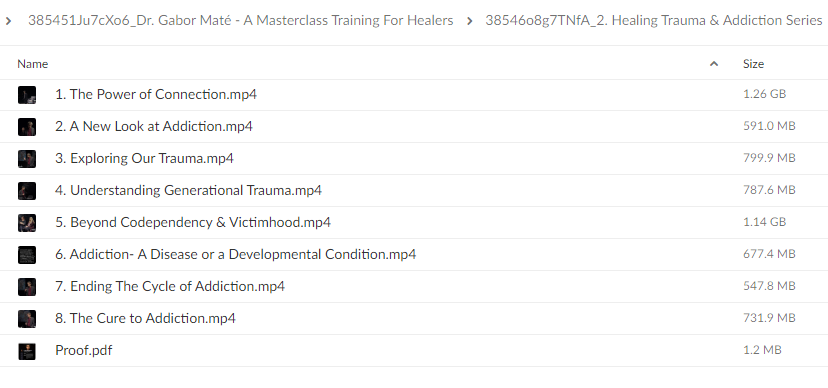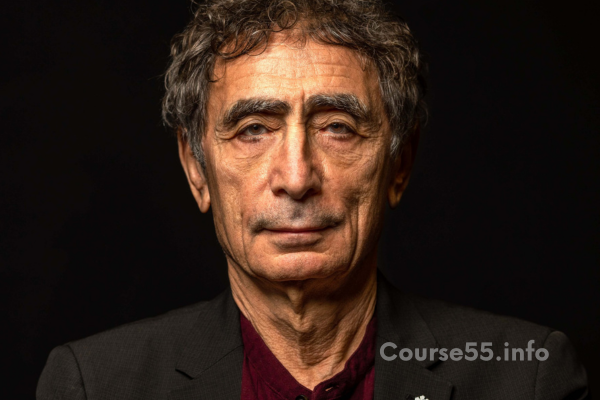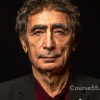Healing Trauma & Addiction By Dr. Gabor Maté
$99.00 Original price was: $99.00.$15.40Current price is: $15.40.
Healing Trauma & Addiction – Immediate Download!
Let See The Content Inside This Course:

Description:
The complexity of trauma and addiction disorders has drawn more attention in recent years from both mental health experts and the general public. Dr. Gabor Maté’s program “Healing Trauma & Addiction” provides a thorough examination of these interrelated issues, challenging viewers to reconsider the traditional perception of addiction as a reaction that frequently results from unresolved emotional pain and trauma rather than as a sign of personal weakness.
In addition to illuminating the underlying roots of addiction, Dr. Maté’s holistic approach highlights the vital role that compassionate care and community support play in the healing process. This essay will explore the fundamental ideas of this life-changing program, emphasizing its importance and influence on people and families navigating the turbulent waters of addiction and trauma.

Understanding the Relationship Between Trauma and Addiction
The foundational premise of Dr. Maté’s work revolves around the intricate relationship between trauma and addiction. Generally, society has viewed addiction through the lens of disease models, positioning it as a failure of willpower or moral character. However, Dr. Maté challenges this narrative, passionately arguing that unresolved trauma is often the root cause of addictive behaviors. In essence, addiction may be a misguided attempt at self-medication, a way individuals seek to cope with emotional pain.
To illustrate this point, consider the following outline of how trauma can manifest in addictive behaviors:
- Roots of Trauma: Events like childhood abuse, neglect, loss, or any significant emotional distress can leave lasting scars.
- Coping Mechanisms: In an attempt to escape unbearable feelings associated with trauma, individuals may turn to substances, such as alcohol or drugs, or engage in compulsive behaviors.
- Cycle of Addiction: As the addictive behavior intensifies, so too does the underlying trauma, creating a vicious cycle difficult to break.
Through this lens, it becomes clear that addressing addiction requires more than just willpower or medical intervention; it necessitates a compassionate understanding of a person’s history and emotional landscape. Dr. Maté’s insights encourage a shift from judgment to empathy, emphasizing the importance of understanding the ‘why’ behind an individual’s actions rather than solely focusing on the actions themselves.
The Holistic Approach to Healing
Dr. Gabor Maté is renowned for his holistic approach toward healing trauma and addiction, which diverges from traditional treatment methods that often treat only the symptoms rather than the underlying causes. His framework advocates for a more integrative form of therapy that recognizes the interplay between the mind and body, emotional and physical health. This approach is crucial for effective treatment and long-term recovery.
A key aspect of Dr. Maté’s philosophy is the concept of trauma-informed care. This model emphasizes several critical elements:
- Recognition and Validation: Recognizing the signs of past trauma in clients and validating their experiences.
- Creating Safety: Establishing a safe environment where individuals feel secure enough to explore their trauma.
- Empathetic Relationships: Encouraging the development of empathetic, supportive relationships to aid in the healing journey.
This holistic approach contributes to individuals feeling seen and understood, often resulting in profound breakthroughs in therapy. By acknowledging the connection between emotional pain and addiction, Dr. Maté promotes healing that is not simply about abstaining from substances but about healing the heart and mind.
Community Support and Shared Vulnerability
One of the most striking features of Dr. Maté’s program is its emphasis on community support and shared vulnerability. Recovery is often portrayed as a solitary journey, filled with shame and isolation. However, Dr. Maté firmly believes that collective healing plays an essential role in overcoming trauma and addiction. Building a network of support fosters shared vulnerability, allowing individuals to break free from the chains of isolation.
- Therapeutic Communities: Engaging in support groups or community-based therapy models where individuals can share their stories and experiences.
- Peer Support: Recognizing that those who have faced similar struggles often provide the most profound empathy and understanding.
- Encouraging Connection: Prioritizing connection over isolation, emphasizing that healing happens in relationships.
By focusing on community and shared vulnerability, Dr. Maté’s framework helps individuals feel they are not alone on their journey. It averts the stigma often associated with addiction and trauma, promoting a culture of acceptance and understanding.
Practical Suggestions for Healing
Dr. Gabor Maté provides an array of practical strategies that individuals can adopt to facilitate their healing journey. Integrating these approaches into daily life can create a powerful therapeutic environment.
Here are some practical suggestions inspired by Dr. Maté’s teachings:
- Mindfulness Practices: Incorporating mindfulness techniques, such as meditation, can help individuals become attuned to their emotional states and recognize triggers.
- Journaling: Writing about experiences can facilitate emotional expression and help individuals confront unresolved trauma.
- Therapeutic Modalities: Exploring modalities like somatic experiencing or art therapy that engage both the mind and body can deepen the healing process.
- Building Support Networks: Actively seeking out community resources, support groups, or connecting with individuals who have similar experiences.
These strategies not only promote self-awareness but also encourage individuals to engage actively in their healing process rather than adopting a passive stance.
In conclusion
Dr. Gabor Maté’s ideas on addiction and trauma recovery represent a paradigm leap in our comprehension and strategy for dealing with these intricate problems. Dr. Maté welcomes us into a more sympathetic realm of understanding by presenting addiction as a reaction to unresolved emotional anguish rather than merely a sign of moral failing. His all-encompassing, trauma-informed method emphasizes how crucial shared vulnerability and community support are to the healing process. Adopting these principles can help people and families alike develop resilience, empathy, and a life-changing healing process as we continue to traverse the complex terrain of trauma and addiction.
Frequently Requested Enquiries:
Innovation in Business Models: We employ a group buying strategy that allows customers to divide costs and receive a lower rate for popular courses. Despite content providers’ concerns about distribution tactics, this approach benefits low-income individuals.
Legal Aspects: The legality of our conduct raises a number of complex issues. Although we do not have the course developer’s official permission to redistribute their content, there are no clear resale restrictions stated at the time of purchase. We have the opportunity to provide affordable educational resources because of this uncertainty.
Quality Control: We ensure that all of the course materials we purchase are identical to those supplied by the writers. However, it is important to understand that we are not approved vendors. Consequently, our products don’t include:
– In-person consultations or phone conversations with the course developer for advice.
– Access to sites or organizations that are exclusive to authors.
– Engaging in private forums.
– Simple email support from the author or their team.
By offering these courses independently, without the premium services of the official channels, we hope to reduce the barrier to education. We appreciate your understanding of our unique approach.
Be the first to review “Healing Trauma & Addiction By Dr. Gabor Maté” Cancel reply
You must be logged in to post a review.

















Reviews
There are no reviews yet.